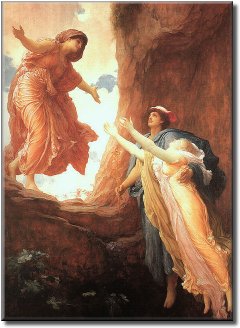The Festival of the Greater Elusinia
Greece,
September 23-Oct 1
 Demeter
was the protectress of Women and the deity of marriage, motherhood, maternal
love and fidelity. The ancient
Greeks believed that it was Demeter who gave them the first seeds of wheat,
taught them how to till the soil and how to make bread from the grain.
It is because of this that Demeter was also more commonly known to rule
over crops, corn, the plow, vegetation, fruitfulness and agriculture.
Demeter
was the protectress of Women and the deity of marriage, motherhood, maternal
love and fidelity. The ancient
Greeks believed that it was Demeter who gave them the first seeds of wheat,
taught them how to till the soil and how to make bread from the grain.
It is because of this that Demeter was also more commonly known to rule
over crops, corn, the plow, vegetation, fruitfulness and agriculture.
Typically,
it was the Women who cared for the fields, plowed and scattered the seed and
reaped the harvest. So it was natural they felt that a Woman divinity could best
understand and help Women's work. It
was through Demeter that the fields of grain were hallowed.
Demeter's rule did not limit itself to just the fields, it was the
threshing floor too that was under her protection as both are considered her
temples; at any moment she might be present.
So,
it is by no accident then that her chief festival came at the harvest time.
In earlier days, this might have been a simple thanksgiving day.
In later years, the humble feast grew into a mysterious worship, about
which we know very little. The
Greater Elusinia festival, in September, came only every five years, but it
lasted for nine days. During this time the people marched through the streets,
often barefoot, while wearing flowered garlands and the fruits and crops of the
season were made into feast. This
public celebration is commonly known and has been related by many writers.
However, the ceremony that took place in the temple has never been
described because those who participated were bound by a vow of silence that
remains.
DEMETER-The Goddess-The Myth
She
was sister to Zeus, and goddess of fertility. She had various lovers, including
her brother Zeus. One of her children was Persephone (by Zeus), who was carried
off by Hades (god of the underworld). Once the flowerlike Persephone, her lovely
daughter, disappeared; Demeter, could find her nowhere. The weeping Demeter
searched and searched through the fields, crying out for the daughter who she so
loved. Demeter fretfully clutched her blue-green cloak, then thoughtlessly
shredded it into tiny pieces, scattering them as cornflowers in the grasses. But
flowers and grasses soon faded, for Demeter was the source of all growth; as she
mourned, the goddess withdrew her energy from the plants, which began to wilt
and shrivel. So the happy earth changed for the first time into the yellow-gold,
autumnal aspect of Demeter. The goddess wandered through the dying earth until
she came to a town near Athens. There she took a job as nursemaid to Metanira,
queen of Eleusis, as caretaker for her son Triptolemos. Demeter developed a
strong maternal love for the boy and decided to make him immortal, by smoking
him like a log in the fireplace. The frantic queen discovered them, and the
disguised goddess is revealed. She desists in her effort to make Triptolemos
immortal but, in gratitude, teaches him the art of growing corn. Demeter stayed
on in Eleusis, often sitting sadly by a well as she wept for the loss of her
beloved daughter. One day the queen's daughter Baubo (Iambe) saw the sad goddess
at the well and tried to comfort her. Demeter refused all her consoling words
and so, to make the goddess smile, Baubo exposed her vulva salaciously.
Surprised, Demeter chuckled, the first laughter the starving earth had heard
from its goddess in many months. Shortly afterward, Persephone was restored to
her mother for six months each year, and spring bloomed again on the earth after
the long winter; the six months she has to spend with Hades in the underworld is
winter and the six months with her mother is spring. In gratitude for the
hospitality of the Eleusinians, Demeter taught the arts of agriculture to Prince
Triptolemos and thereafter based her mysterious rites at that city.
Credits to amazing women and their books:
365 Goddesses by Patricia Telesco (1998)
When God was a Woman by Merlin Stone (1976)
Mythology (Timeless tales of Gods and Heroes) by Edith Hamilton (1969)
Moon Magick by D.J. Conway (1998)
*Painting by: Fredrick Lord Leighton (1891)

